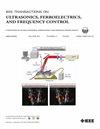Investigating the Use of Traveltime and Reflection Tomography for Deep Learning-Based Sound-Speed Estimation in Ultrasound Computed Tomography
IF 3.7
2区 工程技术
Q1 ACOUSTICS
IEEE transactions on ultrasonics, ferroelectrics, and frequency control
Pub Date : 2024-09-12
DOI:10.1109/TUFFC.2024.3459391
引用次数: 0
Abstract
Ultrasound computed tomography (USCT) quantifies acoustic tissue properties such as the speed-of-sound (SOS). Although full-waveform inversion (FWI) is an effective method for accurate SOS reconstruction, it can be computationally challenging for large-scale problems. Deep learning-based image-to-image learned reconstruction (IILR) methods can offer computationally efficient alternatives. This study investigates the impact of the chosen input modalities on IILR methods for high-resolution SOS reconstruction in USCT. The selected modalities are traveltime tomography (TT) and reflection tomography (RT), which produce a low-resolution SOS map and a reflectivity map, respectively. These modalities have been chosen for their lower computational cost relative to FWI and their capacity to provide complementary information: TT offers a direct SOS measure, while RT reveals tissue boundary information. Systematic analyses were facilitated by employing a virtual USCT imaging system with anatomically realistic numerical breast phantoms (NBPs). Within this testbed, a supervised convolutional neural network (CNN) was trained to map dual-channel (TT and RT images) to a high-resolution SOS map. Single-input CNNs were trained separately using inputs from each modality alone (TT or RT) for comparison. The accuracy of the methods was systematically assessed using normalized root-mean-squared error (NRMSE), structural similarity index measure (SSIM), and peak signal-to-noise ratio (PSNR). For tumor detection performance, receiver operating characteristic (ROC) analysis was employed. The dual-channel IILR method was also tested on clinical human breast data. Ensemble average of the NRMSE, SSIM, and PSNR evaluated on this clinical dataset was 0.2355, 0.8845, and 28.33 dB, respectively.研究超声计算机断层扫描中基于深度学习的声速估计中旅行时间和反射断层扫描的使用。
超声波计算机断层扫描(USCT)可量化声学组织特性,如声速(SOS)。虽然全波形反演(FWI)是精确 SOS 重建的有效方法,但对于大规模问题而言,其计算难度很大。基于深度学习的图像到图像学习重建(IILR)方法可以提供计算效率高的替代方法。本研究探讨了所选输入模式对用于 USCT 高分辨率 SOS 重建的 IILR 方法的影响。所选模式为旅行时间层析成像(TT)和反射层析成像(RT),它们分别生成低分辨率 SOS 图和反射率图。之所以选择这两种模式,是因为它们的计算成本比全波层析成像低,而且能够提供补充信息:TT 可直接测量 SOS,而 RT 可显示组织边界信息。采用虚拟 USCT 成像系统和解剖逼真的数字乳房模型,有助于进行系统分析。在这个测试平台上,对有监督的卷积神经网络(CNN)进行了训练,以将双通道(TT 和 RT 图像)映射到高分辨率 SOS 地图上。单输入 CNN 分别使用每种模式(TT 或 RT)的输入进行训练,以进行比较。使用归一化均方根误差(NRMSE)、结构相似性指数(SSIM)和峰值信噪比(PSNR)系统地评估了这些方法的准确性。在肿瘤检测性能方面,采用了接收器工作特性分析。双通道 IILR 方法还在人体乳腺临床数据上进行了测试。在该临床数据集上评估的 NRMSE、SSIM 和 PSNR 的集合平均值分别为 0.2355、0.8845 和 28.33 dB。
本文章由计算机程序翻译,如有差异,请以英文原文为准。
求助全文
约1分钟内获得全文
求助全文
来源期刊
CiteScore
7.70
自引率
16.70%
发文量
583
审稿时长
4.5 months
期刊介绍:
IEEE Transactions on Ultrasonics, Ferroelectrics and Frequency Control includes the theory, technology, materials, and applications relating to: (1) the generation, transmission, and detection of ultrasonic waves and related phenomena; (2) medical ultrasound, including hyperthermia, bioeffects, tissue characterization and imaging; (3) ferroelectric, piezoelectric, and piezomagnetic materials, including crystals, polycrystalline solids, films, polymers, and composites; (4) frequency control, timing and time distribution, including crystal oscillators and other means of classical frequency control, and atomic, molecular and laser frequency control standards. Areas of interest range from fundamental studies to the design and/or applications of devices and systems.

 求助内容:
求助内容: 应助结果提醒方式:
应助结果提醒方式:


